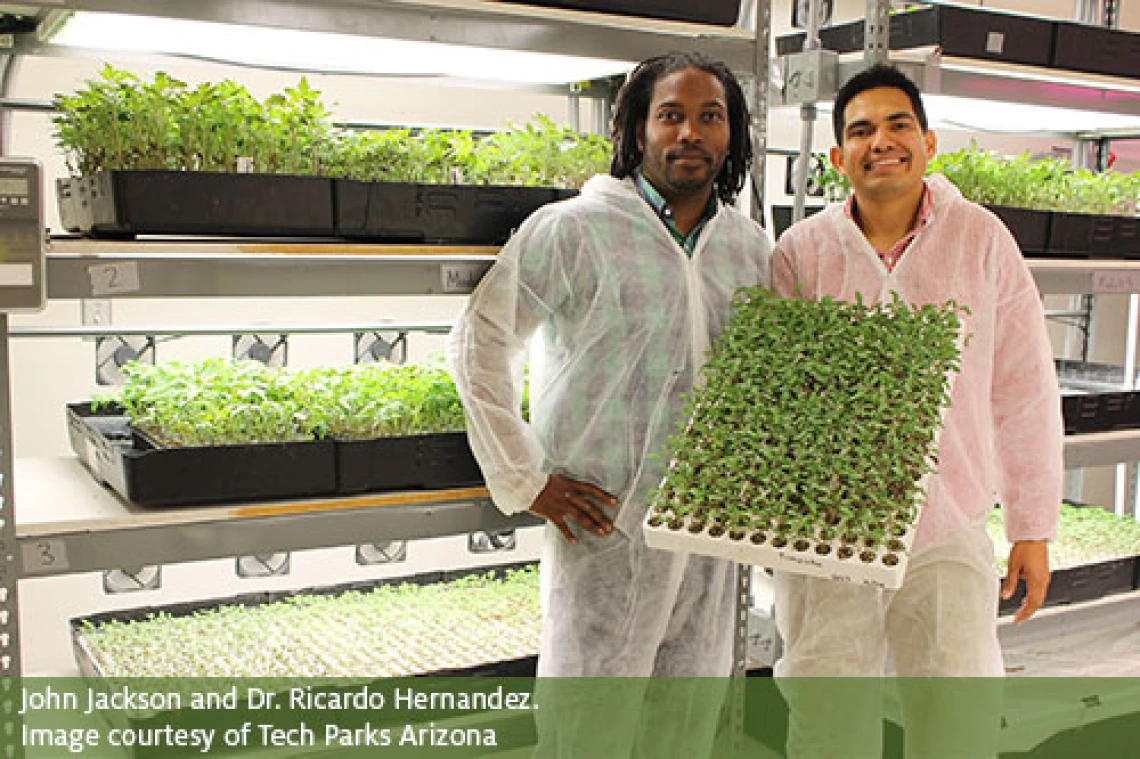UA Alumni-owned Company Awarded $100K USDA-SBIR Grant

TUCSON, Ariz. – University of Arizona alumni entrepreneurs Dr. Ricardo Hernandez and John Jackson of Grafted Growers, LLC have been awarded a $100,000 Phase I USDA-SBIR(link is external) grant. SBIR (Small Business Innovation Research) grants support technology innovation by providing federal research funds to help grow small technology-based businesses. With the award, they are working in collaboration with Dr. Chieri Kubota from the School of Plant Sciences and Dr. Murat Kacira from the Department of Agriculture and Biosystems Engineering at the UA, as well as team members from the Arizona Center for Innovation (AZCI) and Tech Launch Arizona (TLA). Together, this multi-disciplinary team will commercialize novel crop-production strategies that got their start – and are continuing to develop – through UA research.
The company received the USDA-SBIR grant award for its use of innovative methods and equipment for planting, growing and harvesting food crops. In addition to helping improve the process and resource efficiency associated with growing vegetable transplants, these same methods can be utilized for improving agriculture, horticulture and floriculture operations. The goal is to create a sustainable indoor growing system, (or “SIGS”) that will produce affordable, higher quality grafted vegetable transplants with fewer resources – such as water, fertilizers and pesticides – while maintaining a smaller land footprint than existing greenhouse and open-field agriculture systems.
Hernandez received his Ph.D. from the School of Plant Sciences, and Jackson received his M.B.A. from the Eller College of Management. As they were pursuing their academically separate studies, the two met while in the top-ranked McGuire Program for Entrepreneurship, where they began collaborating on their idea for Grafted Growers.
The commercialization potential of this project is high, since the growing systems and their output (i.e. high-quality vegetable transplants) can both be commercialized as unique, innovative products for different markets. With the banning of methyl bromide, an ozone depleting fumigant, the adoption of grafted vegetable plants by hydroponic growers and field growers for increased vigor and disease resistance is growing and has a market size of 2 billion dollars a year in tomato transplants alone. Additionally, the indoor farming market is booming and the availability of affordable, functional indoor growing systems is limited.
According to Jackson, “The SBIR Program is a critical piece in the puzzle of converting scientific knowledge into impactful products and services that address problems facing American industries.”
Grafted Growers hopes to become the only closed system, globally local supplier of high quality grafted vegetable transplants to U.S. and international growers of specialty crops.
The winning of this $100,000 SBIR grant represents a win not just for Grafted Growers, but for the UA, TLA and the State of Arizona as well. This past year, TLA started SBIR/STTR Tech House, a program designed to drastically increase the region's economic competitiveness by putting the power of research behind new and small businesses. Under the leadership of TLA, the University has set a goal to increase competitiveness and become one of the top 10 regions per capita in the nation.
Jen Watson, Ph.D., leads the TLA SBIR/STTR Tech House program for Tech Launch Arizona.
“Grafted Growers did an excellent job building a team with complementary skills and creating a winning proposal,” she says. “TLA’s SBIR/STTR Tech House is available to assist companies in connecting to resources and partners that will help them be improve their chances of being successful at SBIR/STTR.”
More information on the connections and services available through SBIR/STTR Tech House are at http://techlaunch.arizona.edu/sbirsttr-tech-house.
Along with his entrepreneurial efforts with Grafted Growers, Jackson also serves as Manager of Business Intelligence at Tech Launch Arizona.

